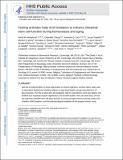| dc.contributor.author | Mihaylova, Maria M. | |
| dc.contributor.author | Cheng, Chia-Wei | |
| dc.contributor.author | Cao, Amanda Q. | |
| dc.contributor.author | Tripathi, Surya | |
| dc.contributor.author | Mana, Miyeko D. | |
| dc.contributor.author | Bauer-Rowe, Khristian E. | |
| dc.contributor.author | Abu-Remaileh, Monther | |
| dc.contributor.author | Clavain, Laura | |
| dc.contributor.author | Erdemir, Aysegul | |
| dc.contributor.author | Lewis, Caroline A. | |
| dc.contributor.author | Freinkman, Elizaveta | |
| dc.contributor.author | Huang, Yanmei | |
| dc.contributor.author | Bell, George W. | |
| dc.contributor.author | Sabatini, David M. | |
| dc.contributor.author | Yilmaz, Ömer H. | |
| dc.date.accessioned | 2020-04-17T13:27:03Z | |
| dc.date.available | 2020-04-17T13:27:03Z | |
| dc.date.issued | 2018-05 | |
| dc.identifier.issn | 1934-5909 | |
| dc.identifier.uri | https://hdl.handle.net/1721.1/124714 | |
| dc.description.abstract | Diet has a profound effect on tissue regeneration in diverse organisms, and low caloric states such as intermittent fasting have beneficial effects on organismal health and age-associated loss of tissue function. The role of adult stem and progenitor cells in responding to short-term fasting and whether such responses improve regeneration are not well studied. Here we show that a 24 hr fast augments intestinal stem cell (ISC) function in young and aged mice by inducing a fatty acid oxidation (FAO) program and that pharmacological activation of this program mimics many effects of fasting. Acute genetic disruption of Cpt1a, the rate-limiting enzyme in FAO, abrogates ISC-enhancing effects of fasting, but long-term Cpt1a deletion decreases ISC numbers and function, implicating a role for FAO in ISC maintenance. These findings highlight a role for FAO in mediating pro-regenerative effects of fasting in intestinal biology, and they may represent a viable strategy for enhancing intestinal regeneration. Mihaylova et al. show that short-term fasting promotes intestinal stem and progenitor cell function in young and aged mice by inducing a robust fatty acid oxidation (FAO) program. PPARδ agonists emulate these effects, showing that fatty acid metabolism has positive effects on young and old ISCs. | en_US |
| dc.description.sponsorship | National Institutes of Health (U.S.) (Grant R00 AG045144) | en_US |
| dc.description.sponsorship | National Institutes of Health (U.S.) (Grant R01CA211184) | en_US |
| dc.description.sponsorship | National Institutes of Health (U.S.) (Grant R01CA034992) | en_US |
| dc.description.sponsorship | National Institutes of Health (U.S.) (Grant CA103866) | en_US |
| dc.description.sponsorship | National Institutes of Health (U.S.) (K99 Pathway to Independence award K99AG054760) | en_US |
| dc.language.iso | en | |
| dc.publisher | Elsevier BV | en_US |
| dc.relation.isversionof | 10.1016/j.stem.2018.04.001 | en_US |
| dc.rights | Creative Commons Attribution-NonCommercial-NoDerivs License | en_US |
| dc.rights.uri | http://creativecommons.org/licenses/by-nc-nd/4.0/ | en_US |
| dc.source | PMC | en_US |
| dc.subject | Molecular Medicine | en_US |
| dc.subject | Genetics | en_US |
| dc.subject | Cell Biology | en_US |
| dc.title | Fasting Activates Fatty Acid Oxidation to Enhance Intestinal Stem Cell Function during Homeostasis and Aging | en_US |
| dc.type | Article | en_US |
| dc.identifier.citation | Mihaylova, Maria M. et al. "Fasting Activates Fatty Acid Oxidation to Enhance Intestinal Stem Cell Function during Homeostasis and Aging." Cell Stem Cell 22 (2018): 769-778 © 2018 The Author(s) | en_US |
| dc.contributor.department | Whitehead Institute for Biomedical Research | en_US |
| dc.contributor.department | Massachusetts Institute of Technology. Department of Biology | en_US |
| dc.contributor.department | Koch Institute for Integrative Cancer Research at MIT | en_US |
| dc.relation.journal | Cell Stem Cell | en_US |
| dc.eprint.version | Author's final manuscript | en_US |
| dc.type.uri | http://purl.org/eprint/type/JournalArticle | en_US |
| eprint.status | http://purl.org/eprint/status/PeerReviewed | en_US |
| dc.date.updated | 2020-01-30T14:03:33Z | |
| dspace.date.submission | 2020-01-30T14:03:35Z | |
| mit.journal.volume | 22 | en_US |
| mit.journal.issue | 5 | en_US |
| mit.license | PUBLISHER_CC | |
| mit.metadata.status | Complete | |

